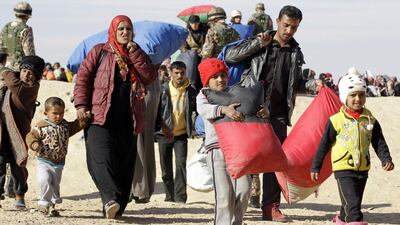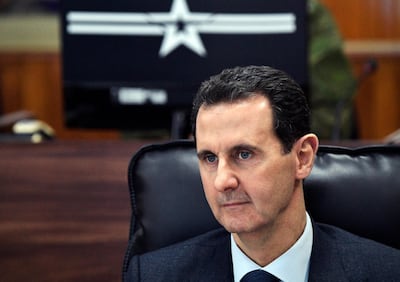A video that was circulated last week in Syrian media outlets has stirred great controversy and fear among Syrians living abroad or who have been displaced by the conflict in their country. It has also highlighted the extent to which the regime of Bashar Al Assad is suffering financially and willing to collectively punish those it chased out of their homes.
The official video featured Elias Bitar, a senior military official in charge of the department in the army that deals with reserves and exemptions from military service. In it, he said the government might seize the assets of Syrians who were over 42 years old and had not paid their military exemption fines – a threat that is likely to have an outsized effect on refugees who fled the country and opponents of the regime living abroad.
By law, Syrians are required to serve in the armed forces for a period as conscripts, but they can be exempted under certain conditions, especially if they reside outside the country and pay a large fee to the authorities. Until recently, the option of paying a fee applied only to Syrians living abroad for a few years. Obligatory military service has long been a tool used by some Arab governments to build a form of attachment to a symbol of national identity and to control the influx of young people into job markets with limited opportunities. This became a critical tool for the Syrian regime as the country descended into civil war.
But due to the economic crisis facing Syria, a perfect storm caused by a lack of foreign currency due to the crisis in neighbouring Lebanon, wartime sanctions, and the subsequent lack of reconstruction funds from abroad to rebuild the destroyed country, the government has taken steps thought unthinkable in the past to secure a sustainable source of funding from an already impoverished population.
In 2020, the government began allowing Syrians residing inside the country to pay a (smaller) fee to secure an exemption from the draft. Those living abroad had the requirements for how long they must live outside Syria before being eligible for exemption reduced. Depending on how many years you spent outside the country, you could be expected to pay between $8,000-10,000.
The government has had the power to confiscate deserters’ assets for a few years now after amending the relevant laws during the war. These measures allow the government to seize the assets of deserters if they do not pay the exemption fee after they reach 42 years of age, to sell them off, and possibly to even freeze the assets of their family members, without due process. But the fact that the government is threatening to do so now shows the dire straits it is in, in addition to essentially being an attempt at extortion.
Syria's economy is in tatters and does not appear on the verge of recovery. Despite winning the war militarily, the Assad regime continues to preside over an economy so decrepit that it could not afford to lock down the country during the coronavirus pandemic. The hyperinflation and banking collapse in neighbouring Lebanon has contributed to the crisis in Syria, where the currency has largely collapsed, and basic staples are becoming too expensive for many families. The regime's refusal to entertain any prospect of reform or serious negotiation with the opposition has resulted in western sanctions remaining in place. In addition, the US during the Trump administration imposed extensive, stringent sanctions as part of the so-called Caesar Act that shut out Syria and its political and business elites from the global financial system.

The government has grown so desperate for hard currency that it has imposed various fees over the past few years to recoup some wealth from its own citizens. Syrian passports are the most expensive in the world, at $800 (more if you are in a hurry), which is more than three times costlier than the next passport in line. In 2020, the government imposed a tax on its own citizens returning to the country, requiring them to exchange $100 at the fictional official rate, in effect imposing a visa fee on its nationals.
The military conscription measures are an obvious cash grab attempt from a regime that, despite a military victory, is economically crippled and has no immediate prospects for revival. But more crucially, it shows how little it values the lives of those who oppose it, or even those who fled the violence to protect their families. Many people evaded military service because they wanted nothing to do with the brutality of the war, and at any rate those living abroad as refugees certainly cannot afford to pay $8,000 to get out of serving in the military. Instead, they risk conscription, detention, or other more severe punishments upon their return.
Syria remains unsafe for its dispersed people. But its regime does not want them to return either – it would rather extort them for protection money, like the mafia it is.
Kareem Shaheen is a veteran Middle East correspondent in Canada and a columnist for The National



